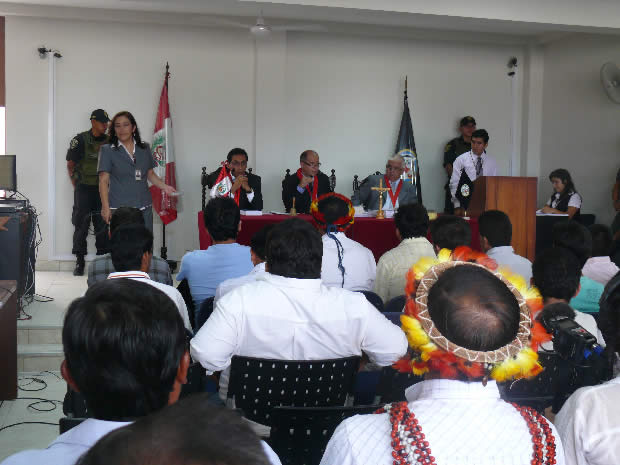
The Due Process of Law Foundation (DPLF), the Centro de Estudios de Derechos, Justicia y Sociedad (Research Center on Law, Justice and Society or DeJusticia of Colombia) and the Centro de Derechos Humanos de la Pontificia Universidad Católica de Ecuador (Human Rights Center of the Catholic University of Ecuador) have presented an Amicus Curiae on one of the most emblematic trials in the last few years in Peru.
On September 18, 2014 the document was submitted before the Transitional Criminal Chamber of Bagua, Peru (Sala Penal Liquidadora Transitoria de Bagua) and raises a number of concerns on how a criminal case is being pursued against Feliciano Cahuasa Rolín and 51 other persons accused of carrying out violent acts that took place on the 5th of June 2009 on the Fernando Belaunde Terry Highway, known as the “Devils Curve”, near the city of Bagua. The trial is based on charges against the 52 persons (23 of whom belong to the awajún-wampis tribes) for various crimes against the State of Peru and 11 members of the Peruvian National Police who died during the conflict.
The objective of the amicus curiae is to alert the Peruvian State of the need for its judicial authorities to observe international human rights standards. Through an analysis of the case file and other publically known information along with observation of the trials carried out before the Sala Penal Liquidadora Transitoria de Bagua in July and August of this year, we have identified actions by the National Police, prosecutors and judges that do not comply with the standards established by the Inter-American and other supranational human rights systems. DPLF deems that this amicus curiae represents an opportunity for the judicial system in question to consider the situation when dictating their decision.
DPLF considers that the lack of compliance with fair trial guarantees in the criminal procedure aimed at investigating the violent events of June 5th, 2009 will not only compromise the fundamental rights of the 52 defendants in the case, but could also impair the demands for justice, truth and reparation of the families of the police officers who regrettably lost their lives on that day. Therefore, DPLF calls on the Peruvian State to duly clarify the facts under strict compliance of the international human rights standards compiled in the amicus curiae.





